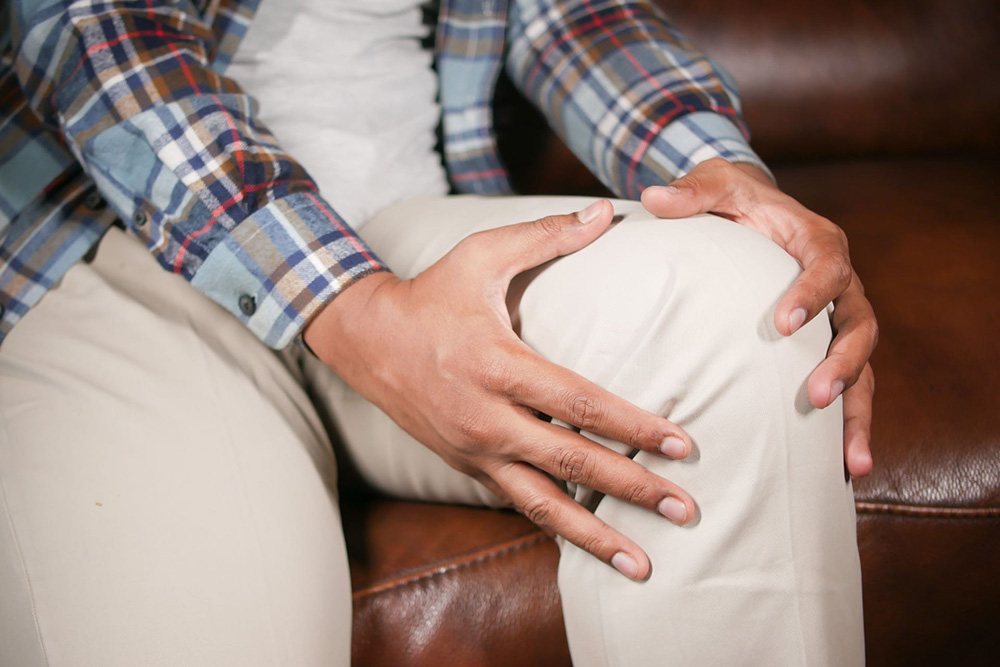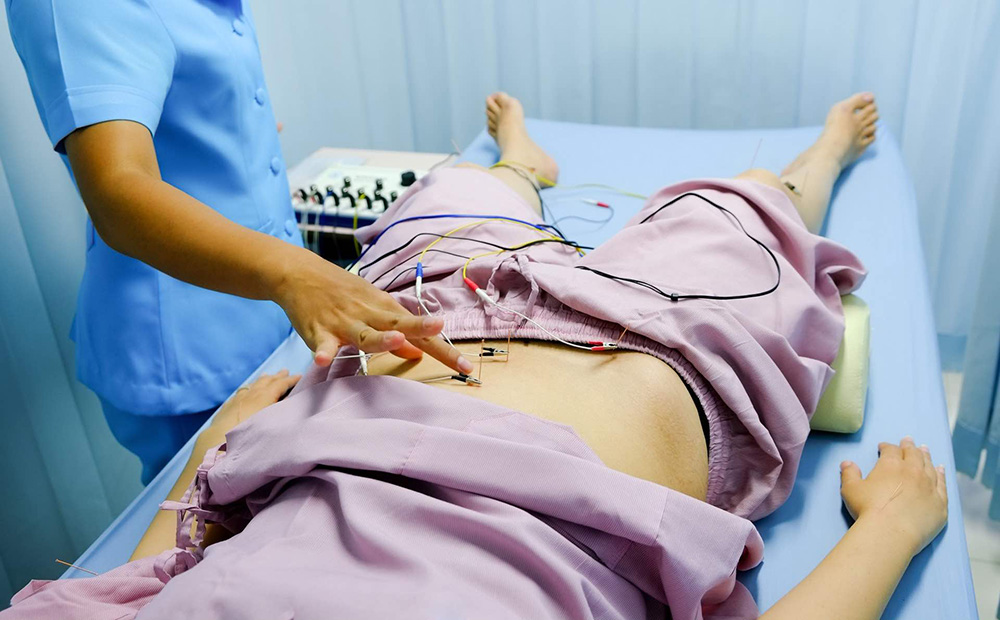Knee pain
Acupuncture is a natural treatment that helps reduce pain and inflammation for knee pain and osteoarthritis of the knee. It works by increasing blood flow to the joint and stimulating the release of body’s natural pain reducers including endorphins, endogenous opiates, and endocannabanoids. It also reduces inflammation to allow the body to heal itself.
I like to say acupuncture works by hitting a reset switch in the body bringing you back to health.
The most common cause of knee pain is osteoarthritis. Clinical studies show that acupuncture is effective alleviating pain, reduce stiffness, and reduce inflammation in osteoarthritis of the knee. It can also increasing range of motion without the use of medications.

In this article I will share with you how acupuncture treats osteoarthritis of the knee, review the clinical research showing acupuncture’s effectiveness, and explain the treatment process.
What is Knee Osteoarthritis?
Osteoarthritis of the knee is caused by degeneration of cartilage in the joints. It affects both the soft tissues and joints, making it difficult to carry out daily activities. While osteoarthritis can affect any joint, it is most common in the knees, hips, and spine. As the condition progresses, the joints become weaker and less flexible, making it difficult for older people to perform daily tasks.
Osteoarthritis is known to cause the knee to swell, become hot, and painful. It affects over 32.5 million Americans. Nearly half of these individuals are over the age of 65. It usually starts after age 50, when cartilage that protects the joints starts to wear down. Women are at a greater risk than men, and certain lifestyle factors, such as smoking and lack of exercise, may increase the likelihood of developing the disease.
Imbalances
Ancient art of acupuncture has been used for thousands of years to treat knee pain and reduce inflammation. It is based on the concept that Qi (pronouced Chi), the body’s essential energy, permeates the body and flows through the body in meridians. Any blockage in this flow interferes with the basic vitality of health.
Injury or wear and tear over time causes the qi to slow down and get stagnation. This condition are called Qi Stagnation. We can also develop an imbalance where there is not enough qi in the body causing illness. This is called Qi Deficency which is a common cause of knee pain.
An acupuncture treatment is customized to you based upon the underlying imbalance causing your knee pain. I combine acupuncture with electric stimulation, called electroacupuncture, to enhance the pain relief and antiinflammtory effects. Also, I will include acupressure massage which has been shown to have a strong affect at reducing pain from knee osteoarthritis.
Reduces Pain
Researchers have found that acupuncture is an effective treatment for osteoarthritis of the knee. During a systematic review of randomized controlled trials, they found evidence that acupuncture improves knee osteoarthritic symptoms, as well as physical dysfunction. (https://pubmed.ncbi.nlm.nih.gov/31305415/)
Acupuncture also causes the the release of feel-good neuro-chemicals, including endorphins and endocannabanoids which help to reduce pain. This is why it reduces pain but also makes patients feel very good and relaxed.
Reduces Inflammation
Electroacupuncture is similar to traditional acupuncture, but it uses clips attached to a small device that delivers a continuous electrical impulse. It enhances the treatments ability to relieve inflammation and promotes better blood circulation. Many studies have shown that it can reduce the inflammatory processes helping to stop the damage to the knee cartilage.
Some studies have also shown that acupuncture can reduce cortisol levels, which help control inflammation. This treatment method reduces pain and increases blood flow to the injured area. This blood brings healing properties and helps pull out fluid and toxins. Additionally, as blood flow increases, inflammation decreases, causing less pressure on the knee joint.

Improves Mobility
A systematic review of the literature found that acupuncture is an effective treatment for osteoarthritis of the knee. It was also found that acupuncture has a positive effect on the range of motion in the knee.In addition to reducing pain and physical dysfunction, acupuncture may also affect other risk factors associated with knee arthritis.
Improves Recovery After Knee Surger
Acupuncture can be and should be integrated with postoperative physical therapy is an excellent option to help reduce pain after knee surgery. Because this has been supported by many research studies, I hope to see more hospitals a facilities incorporating the treatment. You can still come in for treatment after you have been discharged from the hospital to continue the healing process.
According to a recent study, acupuncture has been shown to improve recovery after knee surgery. It helped to reduce pain and the need for painkillers, as well as cut recovery time in half. Another study showed it can relieve inflammation, decrease pain, and reduce opioid use, as well as improve range of motion after knee surgery.
Additionally, a study reported that patients who received acupuncture after surgery were 65 percent less likely to be on an opioid regimen at 30 days after surgery. The researchers found that patients who received acupuncture for pain relief recovered quicker than those who did not. The study also showed that acupuncture can reduce the amount of pain experienced after total knee replacement surgery.
How many sessions are needed?
The frequency of acupuncture sessions depends on your condition and the severity of your pain. Generally, patients will come in for treatments once or twice a week. The treatment course is usually 8-10 weeks.
Usually, the first appointment can last 60-75 minutes, including a discussion of symptoms and the treatment process. Following this, future appointments can take anywhere from 45 to 60 minutes.
Acupuncture can use used alongside physical therapy and not a substitute for prescription medications. However, many patients use acupuncture to cut down or come off of prescription medications.
There are several acupuncture points on the knee that are particularly effective for knee osteoarthritis including St 36, Sp 9, St 35, Sp 10 Sp 6, KI 3, and Liver 3. Treating these points can relieve pain and swelling in the knee, promoting local blood circulation.
Acupuncture is a very safe and has only a few minor side effects such as soreness or bruising. Most people feel very relaxed and refreshed after an acupuncture treatment.
References :
- Zhang, R., Lao, L., Ren, K., & Berman, B. M. (2014). Mechanisms of acupuncture-electroacupuncture on persistent pain. Anesthesiology, 120(2), 482-503. doi:10.1097/ALN.0000000000000101
- Cao, L., Zhang, X. L., Gao, Y. S., & Jiang, Y. (2012). Needle acupuncture for osteoarthritis of the knee. A systematic review and updated meta-analysis. Saudi Med J, 33(5), 526-532. Retrieved from https://www.ncbi.nlm.nih.gov/pubmed/22588814
- Chen, T., Zhang, W. W., Chu, Y. X., & Wang, Y. Q. (2020). Acupuncture for Pain Management: Molecular Mechanisms of Action. Am J Chin Med, 48(4), 793-811. doi:10.1142/S0192415X20500408
- Hu, B., Bai, F., Xiong, L., & Wang, Q. (2017). The endocannabinoid system, a novel and key participant in acupuncture’s multiple beneficial effects. Neurosci Biobehav Rev, 77, 340-357. doi:10.1016/j.neubiorev.2017.04.006
- Shi, X., Yu, W., Wang, T., Battulga, O., Wang, C., Shu, Q., . . . Guo, C. (2020). Electroacupuncture alleviates cartilage degradation: Improvement in cartilage biomechanics via pain relief and potentiation of muscle function in a rabbit model of knee osteoarthritis. Biomed Pharmacother, 123, 109724. doi:10.1016/j.biopha.2019.109724
- Corbett, M. S., Rice, S. J., Madurasinghe, V., Slack, R., Fayter, D. A., Harden, M., . . . Woolacott, N. F. (2013). Acupuncture and other physical treatments for the relief of pain due to osteoarthritis of the knee: network meta-analysis. Osteoarthritis Cartilage, 21(9), 1290-1298. doi:10.1016/j.joca.2013.05.007
- Ko, H. F., Chen, C. H., Dong, K. R., & Wu, H. C. (2021). Effects of Acupuncture on Postoperative Pain After Total Knee Replacement: Systematic Literature Review and Meta-Analysis. Pain Med, 22(9), 2117-2127. doi:10.1093/pm/pnab201
- Tedesco, D., Gori, D., Desai, K. R., Asch, S., Carroll, I. R., Curtin, C., . . . Hernandez-Boussard, T. (2017). Drug-Free Interventions to Reduce Pain or Opioid Consumption After Total Knee Arthroplasty: A Systematic Review and Meta-analysis. JAMA Surg, 152(10), e172872. doi:10.1001/jamasurg.2017.2872